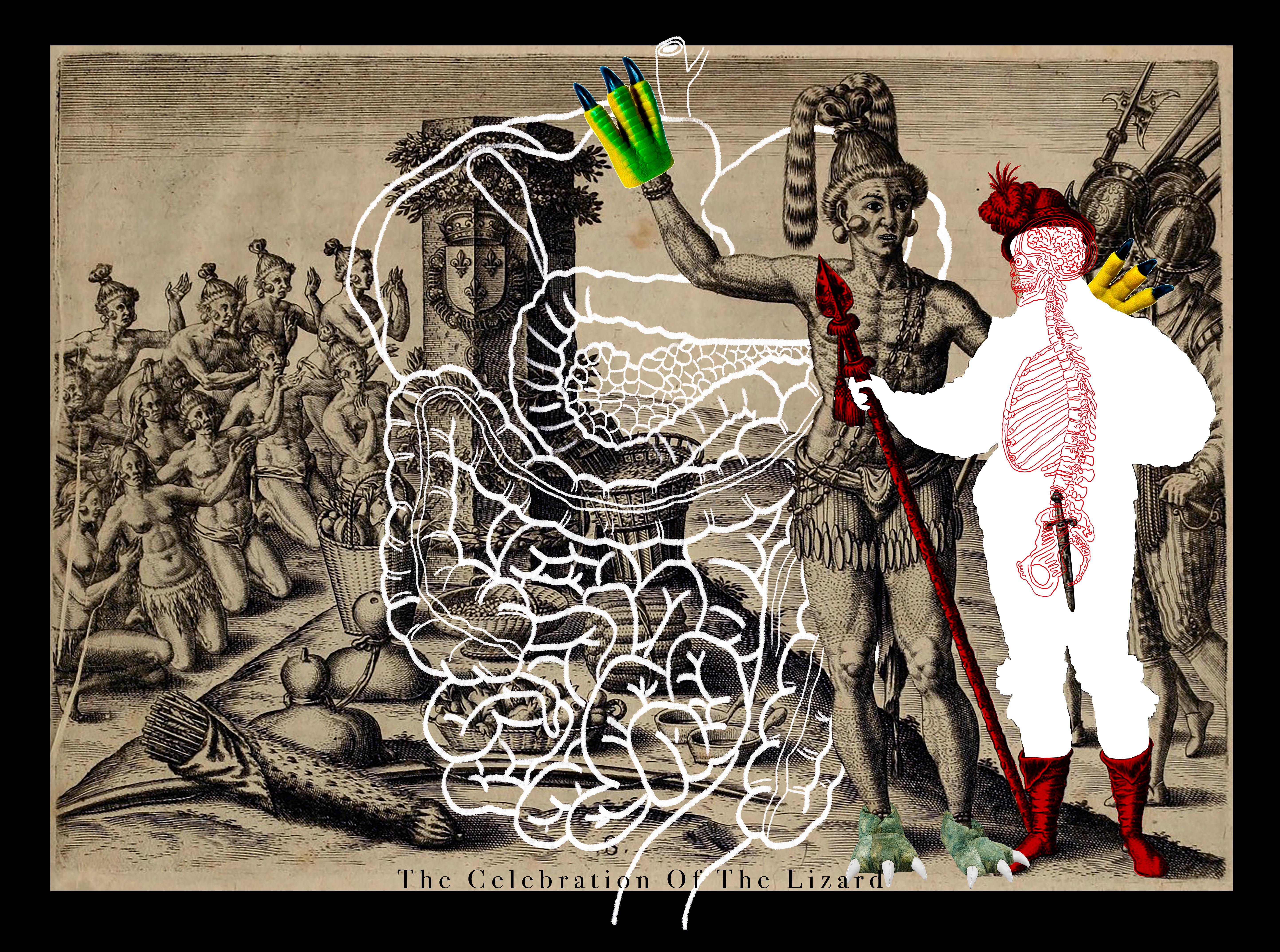FUTURES UNINSCRIBED: CONTEMPORARY INDIGENOUS ARTISTIC PRACTICE

‘Futures Uninscribed’ is part of the ‘Unmaking to Make’ edited volume and focuses upon the practice of the artist Denilson Baniwa.
The chapter examines the emergence and consolidation of contemporary Indigenous art (Arte Indígena Contemporânea, AIC) in Brazil through a critical engagement with the practices of Indigenous artists with a particular focus on Denilson Baniwa and Jaider Esbell. Beginning with their interventions in São Paulo in 2017–2018, the chapter situates AIC as a response to the historical erasure of Indigenous artistic agency and the extractive practices of Brazilian modernism. Figures such as Mário and Oswald de Andrade and Tarsila do Amaral appropriated Indigenous concepts and imagery in order to construct national cultural narratives, while simultaneously denying Indigenous production the status of “art.” Denilson and Jaider’s work contests this legacy by reclaiming antropofagia—long celebrated as a modernist metaphor for Brazilian identity—as an Indigenous strategy of retomada, a reclamation of land, knowledge, and cultural legitimacy.
The chapter then broadens its scope to consider the international reception of Indigenous artistic practice, contrasting the superficial “decolonial camouflage” often encountered in European exhibitions with more sustained, dialogical approaches. Through the case of Andrés Pereira Paz’s Radio Carabuco in Berlin, it highlights the potential for art to engage critically with colonial legacies without flattening or commodifying them. Denilson’s later participation in Reinventing the Américas at the Getty Research Institute illustrates how Indigenous interventions can subvert colonial archives by unsettling linear conceptions of time, re-inscribing ancestral futures, and foregrounding affective relations.
Ultimately, the chapter argues that AIC constitutes a radical critique of modernist trajectories and a generative framework for imagining futures beyond coloniality. By weaving together humour, community-building, and conceptual innovation, Indigenous artists articulate plural pathways toward futures that are ancestral, relational, and uninscribed by colonial temporality. In doing so, their practices offer not only counter-narratives to canonical modernism but also propositions for how to live otherwise in the present.
Image
The Celebration of the Lizard, Denilson Baniwa, 2022. Courtesy of the artist. © Denilson Baniwa.
The chapter examines the emergence and consolidation of contemporary Indigenous art (Arte Indígena Contemporânea, AIC) in Brazil through a critical engagement with the practices of Indigenous artists with a particular focus on Denilson Baniwa and Jaider Esbell. Beginning with their interventions in São Paulo in 2017–2018, the chapter situates AIC as a response to the historical erasure of Indigenous artistic agency and the extractive practices of Brazilian modernism. Figures such as Mário and Oswald de Andrade and Tarsila do Amaral appropriated Indigenous concepts and imagery in order to construct national cultural narratives, while simultaneously denying Indigenous production the status of “art.” Denilson and Jaider’s work contests this legacy by reclaiming antropofagia—long celebrated as a modernist metaphor for Brazilian identity—as an Indigenous strategy of retomada, a reclamation of land, knowledge, and cultural legitimacy.
The chapter then broadens its scope to consider the international reception of Indigenous artistic practice, contrasting the superficial “decolonial camouflage” often encountered in European exhibitions with more sustained, dialogical approaches. Through the case of Andrés Pereira Paz’s Radio Carabuco in Berlin, it highlights the potential for art to engage critically with colonial legacies without flattening or commodifying them. Denilson’s later participation in Reinventing the Américas at the Getty Research Institute illustrates how Indigenous interventions can subvert colonial archives by unsettling linear conceptions of time, re-inscribing ancestral futures, and foregrounding affective relations.
Ultimately, the chapter argues that AIC constitutes a radical critique of modernist trajectories and a generative framework for imagining futures beyond coloniality. By weaving together humour, community-building, and conceptual innovation, Indigenous artists articulate plural pathways toward futures that are ancestral, relational, and uninscribed by colonial temporality. In doing so, their practices offer not only counter-narratives to canonical modernism but also propositions for how to live otherwise in the present.
The Celebration of the Lizard, Denilson Baniwa, 2022. Courtesy of the artist. © Denilson Baniwa.
auflynn [at] arts.ucla.edu
Alex Ungprateeb Flynn is an Associate Professor at the Department of World Arts and Cultures/Dance, University of California, Los Angeles. Working as an anthropologist and curator, Alex’s practice explores the intersection of ethnographic and curatorial modes of enquiry. Researching collaboratively with activists, curators and artists in Brazil since 2007, Alex explores the prefigurative potential of art in community contexts, prompting the theorisation of fields such as the production of knowledge, the pluriversal, and the social and aesthetic dimensions of form.